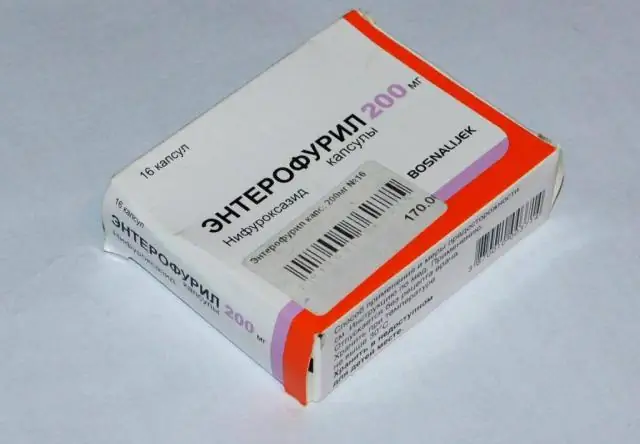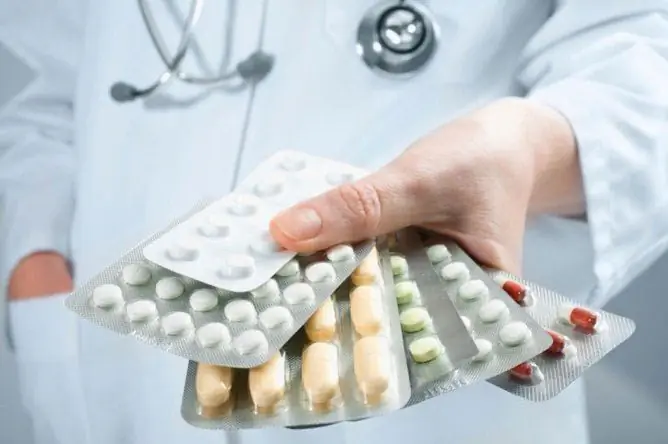- Author Rachel Wainwright wainwright@abchealthonline.com.
- Public 2023-12-15 07:39.
- Last modified 2025-11-02 20:14.
Hepatosan
Hepatosan: instructions for use and reviews
- 1. Release form and composition
- 2. Pharmacological properties
- 3. Indications for use
- 4. Contraindications
- 5. Method of application and dosage
- 6. Side effects
- 7. Overdose
- 8. Special instructions
- 9. Drug interactions
- 10. Analogs
- 11. Terms and conditions of storage
- 12. Terms of dispensing from pharmacies
- 13. Reviews
- 14. Price in pharmacies
Latin name: Hepatosan
ATX code: A05BA
Active ingredient: freeze-dried liver cells of a donor pig (Hepar suis)
Manufacturer: Medminiprom, CJSC (Russia)
Description and photo update: 2019-26-08
Prices in pharmacies: from 359 rubles.
Buy

Hepatosan is a drug with a detoxifying and hepatoprotective effect.
Release form and composition
Hepatosan is produced in the form of capsules: gelatinous solid, No. 0, with a yellow body and lid; the contents of the capsules are light brown powder with a specific smell (10, 20 or 30 pieces in plastic containers, 1 container in a cardboard box).
The composition of 1 capsule contains the active substance: freeze-dried liver cells of a donor pig - 200 mg.
The composition of the gelatin capsule: titanium dioxide - 1.333%, quinoline yellow dye - 0.9197%, sunset yellow dye - 0.0044%, gelatin - up to 100%.
Pharmacological properties
Pharmacodynamics
The action of Hepatosan is based on the properties of xenogenic hepatocytes and their biological components, which are compatible with macromolecules of the human body.
The hepatoprotector contains microelements, cytochromes, amino acids, vitamins, mesenchymal enzymes, and essential phospholipids.
The drug works in two stages:
- intestinal phase: Hepatosan has a detoxifying effect due to the sorption of toxic products in the intestine;
- metabolic (hepatoprotective) phase: biologically active components contribute to the restoration of the functional activity of the liver.
The main properties of the drug:
- detoxification: manifests itself due to the sorption and removal of toxins and toxic products from the intestine, as well as the sorption of high molecular weight volatile fatty acids (isovaleric, valeric, nylon, isocaproic) and their isomers;
- adsorption: due to a delay in the absorption of metabolites of the microflora of the large intestine;
- protein biosynthesis: associated with the 18 amino acids that are part of Hepatosan, due to which their deficiency is replenished and the necessary proteins are synthesized, which improves the metabolic ability of liver cells, sorption and elimination of toxins;
- prevention of destruction of cell membranes: manifests itself as the protection of biological membranes from toxins, which is associated, on the one hand, with inhibition of the capture of toxins by hepatocytes, on the other hand, with the stabilization of cell membranes (inclusion of phospholipids in them). An increase in the detoxifying function of hepatocytes is based on an increase in the concentration of glutathione, as well as on an increase in the activity of redox enzymes.
Indications for use
- Liver cirrhosis of various origins;
- Hepatic failure of acute and chronic course;
- Chronic hepatopathy (hepatosis, hepatitis);
- Poisoning;
- Liver lesions of drug and alcoholic etiology;
- Violation of the digestive process (along with other drugs).
Contraindications
According to the instructions, Hepatosan is contraindicated in case of hypersensitivity to the components of the drug.
Instructions for the use of Hepatosan: method and dosage
Capsules Hepatosan are taken orally with a small amount of water, preferably 15-20 minutes before meals.
The dosage regimen is determined by the indications:
- Liver failure (acute course): 2 capsules 2 times a day, course duration - 10 days;
- Liver failure (chronic course): 2 times a day, 2 capsules, course duration - 20 days. Depending on the severity of the disease and clinical course, on the recommendation of a doctor, it is possible to repeat treatment courses;
- Liver cirrhosis (in the stage of decompensation): 3 times a day, 2 capsules for 10 days, then 2 times a day, 1 capsule for 14 days. To reduce intoxication in patients with liver cirrhosis, 1-2 capsules are constantly prescribed per day.
Side effects
During therapy, allergic reactions may develop.
Overdose
There is no information.
special instructions
Do not exceed the dosage regimen prescribed in the instructions without consulting your doctor.
Before using the drug, as well as in cases of development of uncharacteristic symptoms, you should consult a doctor.
Drug interactions
There is no information on the interaction of Hepatosan with other drugs.
Analogs
Analogs of Hepatosan are: Hepa-Merz, Hepaphor, Heptrong, Glutargin, Glutargin alkoclin, Dipana, Potassium orotat, Carsil, Karsil Forte, Cryomelt MN, Laennek, Legalon 140, Legon 70, Liv.52, Methionine Progepar, Metrop Remaxol, Ropren, Rosilimarin, Silibinin, Silibor, Silimar, Silymarina Sediko, Thiotriazolin, Tykveol, Pumpkin seed oil, Phosphogliv, Phosphogliv forte, Holenol, VG-5, Ornilatex, Lasfal.
Terms and conditions of storage
Store in a dark, dry place out of reach of children at temperatures up to 20 ° C.
Shelf life is 2 years.
Terms of dispensing from pharmacies
Available without a prescription.
Reviews about Hepatosan
Reviews of Hepatosan in most cases indicate its high efficiency. The drug is used in various situations in order to maintain the normal state of the liver, gastrointestinal tract and the body as a whole. It is noted that the remedy helps even with severe poisoning, occurring with significant damage to the liver, as well as other organs.
Price for Hepatosan in pharmacies
The approximate price for Hepatosan (10 capsules) is 367-461 rubles.
Hepatosan: prices in online pharmacies
|
Drug name Price Pharmacy |
|
Hepatosan 0.2 g capsule 10 pcs. 359 r Buy |
|
Hepatosan capsules 200mg 10 pcs. 420 RUB Buy |

Maria Kulkes Medical journalist About the author
Education: First Moscow State Medical University named after I. M. Sechenov, specialty "General Medicine".
Information about the drug is generalized, provided for informational purposes only and does not replace the official instructions. Self-medication is hazardous to health!






